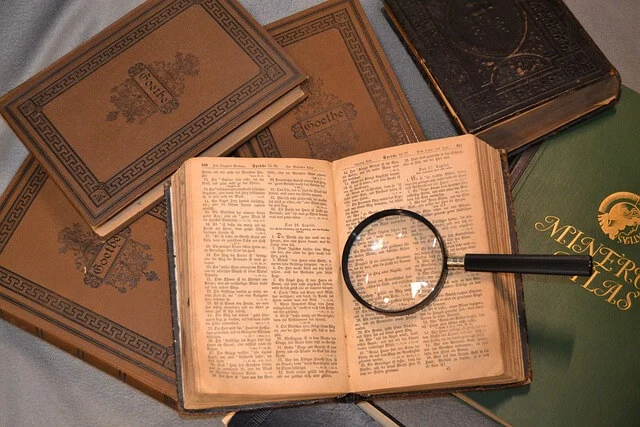Learn English Through Literature: A Journey from Beowulf to Modern Classics
By Tamara Trpkovska
Did you know that diving into the history of English literature can be one of the most enjoyable and effective ways to learn the language? Literature doesn’t just offer a window into history or human experience – it also acts as a powerful tool for expanding your language skills. From improving vocabulary and grammar to gaining a deeper understanding of cultural nuances, the world of literature is a playground for language learners.

In this article, we’ll explore how reading English literature can not only enhance your creativity but also help you master the language. Whether you’re just starting your learning journey or looking to refine your skills, literature offers something for everyone. Ready to see how? Let’s dive in!
Introduction to English Literature
The English language has been growing and changing for over 1400 years, evolving from the Anglo-Saxon literature to the modern literature we all know today. From its earliest roots to today, English has changed dramatically, shaped by invasions, printing, and great writers. Each period in English literary history is not just the stories people told, but also how they spoke, wrote, and thought.
This overview will highlight key moments and figures that contributed to the development of the language and its literature, showing how it started as a tribal dialect and became one of the most widely spoken languages in the world.
The roots of English: Old English (450-1150)
The story of English literature begins with the Anglo-Saxon period, a time when stories were told aloud and writing was just beginning to emerge. Let’s look at how the language and its early literature took shape.
The Anglo-Saxon and Old English
Old English, also known as Anglo-Saxon, was a Germanic language brought to Britain by Anglo-Saxon settlers. This language was characterized by a rich vocabulary of German origin, and its syntax and grammar were very different from the one we have today. The literature during this period was mostly oral, passed down from generation to generation through bardic traditions. With the arrival of Christianity, written records began to emerge, which influenced the transition of the language.
Beowulf is the most well-known work in Old English and a prime example of Anglo-Saxon literature. This epic poem was originally passed down through oral tradition before being written down in Old English. Even though the story is set in Scandinavia, Beowulf reflects the values and language of the Anglo-Saxon people, highlighting themes such as heroism, loyalty, and fate.
However, due to the Norman Conquest of England in 1066, the written works of the Anglo-Saxons became less common.
From Old to Middle: The Middle English Period (1150–1500)
As a result of the Norman Conquest, English went through major changes in vocabulary and grammar. This section explores the development of Middle English and how literature started to find its voice again.
The Norman Conquest and the Decline of Old English
In 1066, William the Conqueror from Normandy invaded England and defeated King Harold at the Battle of Hastings. This event is known as the Norman Conquest, which marked a major turning point in English history, not only politically but also linguistically.
Under the influence of the aristocracy after the Norman Conquest, French became a standard language, which is why so many words today have French origin. This era was called Middle English.
During this period, the most important works were written in French and Latin instead of English. People looked at the English language as a “common” language in comparison to French, which was the language of nobility, and Latin, which was the language of the Church, education, law, and official documents.
Chaucer’s The Canterbury Tales showcased the potential of English as a literary language and solidified the use of the vernacular in written works.
The Role of Geoffrey Chaucer
Geoffrey Chaucer, often called the Father of English Literature, played a crucial role in making Middle English more acceptable for writing. He chose to write for the commoners, portraying everyday lives, not just the lives of saints and knights.
His most famous work, The Canterbury Tales, demonstrated the richness and versatility of English, encouraging writers to embrace the vernacular.
In contrast to Old English, Middle English had simplified grammar and much greater influence from the French. Chaucer had a huge impact on shaping the language we all know today. His work is widely read and has influenced spelling, vocabulary, and grammar. Chaucer’s work demonstrated that English could convey complex ideas, emotions, and stories with sophistication.
The Renaissance and the Rise of Modern English (1500–1700)
The invention of the Printing Press alongside brilliant writers like Shakespeare did a lot for reshaping the English we have and know today. Here is how the English language and literature evolved during this period.
The Printing Press
After Chaucer, the second biggest explosion in the world of English literature was the invention of the printing press by Johannes Gutenberg in the 15th century. Books that were once limited to only the wealthy people became more accessible to ordinary people. For the first time, literature was available for everyone. As more books were printed in English (the language of the people), literature became a gift that allowed commoners to engage with stories, knowledge, and ideas like never before.

The printers began using the London dialect as a standard, which helped unify the language across regions. This standardization not only shaped the future of English but also made it possible for literary works, such as the plays of William Shakespeare, to be widely understood and appreciated by audiences from different social classes.
William Shakespeare’s Impact on the English Language
After Chaucer, William Shakespeare took the evolution of the language even further. Shakespeare is seen as the world’s greatest dramatist; however, he is not just a playwright but a linguistic innovator as well. Writing in the Early Modern English period, he expanded the English vocabulary by creating many phrases that we still use today (e.g, lonely, break the ice, bedazzled, etc.). Through his sonnets, English became more expressive and emotionally rich. Shakespeare’s work helped turn the developing tongue into a refined medium for storytelling, art, and human depth.
King James Bible
The King James Bible was published over 400 years ago and has had a lasting impact on the English language. This work has influenced how we speak and write – even among those who have never read it. Familiar phrases like “give up the ghost”, “the salt of the earth”, and “a law unto herself” originated from this exact work and are still used today.
The King James Bible rose to fame due to many factors: it was read publicly (especially in churches), it was embraced by influential figures like Dickens and Tennyson, and it was published during a formative period for the English Language, alongside works like Shakespeare.
The King James Bible used literal translation from Hebrew and Greek, which resulted in expressions that sounded foreign and awkward; however, they were still accepted in the English language.
257 idioms were identified from the Bible that we still use today, though only 18 were unique to it. Most came from earlier translations, specifically by William Tyndale.
Unlike Shakespeare, who tried to create new vocabulary, the Bible’s translations aimed to keep the old language, which ironically helped shape the modern English language even more.
The Enlightenment and the Age of Reason (1700–1800)
An era where logic took the spotlight and reason ruled over emotion. This section examines how literature reflected these intellectual shifts and gave rise to powerful prose and essays.
The Dictionary of Samuel Johnson
Published in 1755, Samuel Johnson’s A Dictionary of the English Language was a groundbreaking and influential work that remained the leading English dictionary until the early 1900s. Johnson spent eight years compiling the dictionary, which included over 42,000 entries and 140,000 definitions, many supported by 114,000 literary quotations from authors like Shakespeare.
Even though it was not the first dictionary, it was the most comprehensive one. In the dictionary, there were personal opinions added to definitions by Johnson. His work influenced later dictionaries by Noah Webster and the Oxford English Dictionary.
The Enlightenment & Rise of Prose
The Enlightenment happened during the late 17th to the 18th century. This period was defined by a shift towards logic, science, and intellectual inquiry. In contrast to previous periods whose main focus was religion, tradition, and emotion, the Enlightenment focused on reason, evidence, and the pursuit of truth. This philosophical movement had a powerful influence on English literature and language.
Non-fiction prose was a dominant literary form during this period. Authors like Jonathan Swift, Alexander Pope, Joseph Addison, Richard Steele, and Samuel Johnson used essays to explore moral questions, criticize social norms, and promote knowledge. Their writing helped create a more balanced and accessible English, suitable for education, debate, and public life.
This era also gave rise to the scientific method, which demanded a language that is clear, objective, and systematic.
The novels during this period were focused on real people, real dialogues, and real situations. Authors like Daniel Defoe and later Jane Austen brought everyday life into fiction, with language that mirrored actual speech patterns and social behaviors.
The Rise of the Modern Novel (Early 1800s)
Gone were the days of knights and epic quests—this was the era when novels began to speak to real people about real life, and Jane Austen led the charge toward what we now recognize as the modern novel.
Jane Austen & The Rise of the Modern Novel
As the Enlightenment opened the way to the Romantic era, literature began focusing more on individual experience, emotion, and realistic social settings. The most famous author and the heart of this period was Jane Austen.
Austen’s works – such as Pride and Prejudice, Sense and Sensibility, and Emma – explored themes of love, marriage, class, and morality. But what makes it different than other literary works is the narrative style and use of language.
In comparison to earlier literature that was usually overly dramatic, Austen’s works were full of clarity, subtle irony, and keen psychological insight. She developed complex characters with realistic motivations, using sharp dialogue and social observation to bring them to life. Her prose was elegant but accessible, balancing wit and emotional depth.
Her influence helped shape the expectations of what a novel should do: portray real people, explore inner lives, and speak to everyday readers.
She managed to set the stage for later novelists like Charles Dickens, George Eliot, and Virginia Woolf, who continued to build on this foundation.
Romanticism and Emotion in Literature (1800–1850)
From reason to exploring emotion, imagination and nature. Discover how writers explored the supernatural and the deeply personal.
From Wordsworth to Mary Shelley
Romanticism was influenced by earlier movements from the mid-18th century, often called Pre-Romanticism. During this period, a new appreciation of the medieval romance was born, from which Romanticism derives its name. The romance consisted of ballads of chivalric adventure and focused on individual heroism, the exotic, the mysterious, and the supernatural, which was a clear contrast to the elegant formality of the Classic literature, especially works like French Neoclassical tragedies, which emphasized logic, order, and restraint over emotion and imagination.

Romanticism began in the 1790s, when the Lyrical Ballads of William Wordsworth and Samuel Taylor Coleridge were published. Wordsworth’s “Preface” of the second edition (1800) of the Lyrical Ballads, where he describes poetry as “the spontaneous overflow of powerful feelings,” became the manifesto of the English Romantic movement in poetry.
The first phase of the Romantic movement was in Germany, which was marked by innovations, the subconscious, and the supernatural.
The second phase of the Romantic movement was marked by nationalism, folklore, folk dance, and music previously ignored by the medieval and the Renaissance.
An interest in history arose that inspired imaginative storytelling, most notably by Sir Walter Scott, who is often credited for creating the historical novel. Around the same time, English Romantic poetry reached its peak with the powerful and emotional works of poets like John Keats, Lord Byron, and Percy Bysshe Shelley.
A notable by-product of the Romantic focus on deep emotion was a fascination with the supernatural, the mysterious, and the horrifying. This led to the creation of dark, imaginative works such as Mary Shelley’s Frankenstein, which explored the limits of science, morality, and the human soul.
The Victorian Era (1837–1901)
The major changes in the country during the Industrial Revolution caused such turbulence that writers changed their writing style. This shift mirrored the changing society, as writers began to reflect the complexities of modern life and industrial progress.
Charles Dickens and Victorian Literature
The Victorian Era was a period of rapid industrialization, social changes, and empire expansion. The writings from this period reflect the major transformation of English life, from scientific, economic, and technological to class structure and religion in society.
In contrast to Romanticism, which focused on the inward, in the Victorian Age in English literature, the focus fell on social issues.
One of the most influential writers from this period was Charles Dickens. In his work, he captured the struggles of ordinary people during the Industrial Revolution. Through novels like Oliver Twist, David Copperfield, Great Expectations, and A Christmas Carol, Dickens used powerful storytelling to critique the harsh realities of Victorian society while still offering hope, humor, and memorable characters. Dickens was known for his vivid descriptions, emotional depth, and for creating unforgettable characters.
Victorian literature explored themes of morality, family, gender roles, and the contrast between appearances and reality. Other major figures of the era include the Brontë sisters, Thomas Hardy, Elizabeth Gaskell, and George Eliot, all of whom contributed to a rich literary tradition that blended realism with emotional and psychological depth.
Global Expansion of English
From a tribal language to a global powerhouse, English spread across the world through colonization and cultural influence. This section looks at how English became a truly international language
From a Tribal to a Global Language
During the colonial expansion of the British Empire, the English language spread globally. As Britain colonized many countries, English was introduced as a language of administration, education, and trade.
In the 20th century, the rise of the United States and its dominance in industries such as film, music, technology, and science helped make English a key in global communication.
Today, English is considered a global lingua franca – a common language used between speakers of different countries, and it is the most widely studied second language in the world.
English is also the primary or one of the official languages in many countries, including India, Nigeria, Canada, South Africa, and the Philippines.
20th Century Modernists
In response to a changing world, modernist writers broke with tradition to explore inner thoughts, fractured realities, and a sense of alienation. Here’s how they reshaped literature.
The Core Elements of Modernism in English Literature
This literary movement was a response to the rapid changes in society, especially after World War I and the challenges of the modern, industrialized world. Modernists wanted to break away from traditional literary conventions and explore the complexities of individual consciousness, fragmented realities, and the alienation of modern life.
The key characteristics of modernism are stream of consciousness, fragmentation, disillusionment, and focus on the subjective experience of characters.
James Joyce, with his Ulysses, is a great example of experimental narrative, using the stream-of-consciousness techniques to explore the characters’ inner thoughts. Another example is Virginia Woolf, who also experimented with consciousness in her works, such as Mrs. Dalloway and To the Lighthouse.
Other influential Modernists include T.S. Eliot, whose poem The Waste Land captured the fragmentation and despair of post-war society, and Ezra Pound, who helped to shape the movement’s experimental approach. F. Scott Fitzgerald and Ernest Hemingway, while often categorized as part of the American Modernist movement, brought a distinctive style to their works, focusing on the themes of the American Dream, disillusionment, and moral ambiguity.
Modernism transformed the way stories were told, reflecting the uncertainty and complexity of the 20th century. It laid the groundwork for the literary developments that followed, influencing postmodernism and contemporary literature
How can I learn English through literature?
Learning English through literature isn’t just about expanding your vocabulary—it’s about diving into the language in a way that’s both enriching and enjoyable. By exploring different genres, authors, and cultural contexts, literature opens up a world of words, expressions, and nuances that are impossible to fully grasp from textbooks alone. When you read a novel, a short story, or even a poem, you’re not just engaging with the words on the page; you’re immersing yourself in a new way of thinking, speaking, and understanding the world.

Whether you’re reading Jane Austen’s refined social commentary or J.K. Rowling’s whimsical world of magic, each author offers you a unique perspective on language. Literature challenges you to pay attention to rhythm, tone, and even the unsaid parts of conversations. It’s an opportunity to explore various dialects, colloquialisms, and the subtle shifts in meaning that occur through context and metaphor. Over time, as you encounter new vocabulary, idioms, and sentence structures, your understanding of English becomes deeper and more nuanced.
By reading aloud, engaging with literary adaptations, and discussing books with others, you’re not just improving your grammar and syntax—you’re training your mind to think in English. This process makes language acquisition feel less like a chore and more like an adventure, as you get to see how real-life conversations, emotions, and stories unfold in another language.
So, if you’re looking to enhance your English skills, consider making literature your learning companion. From novels that challenge your thinking to poems that capture the beauty of language, there’s something for everyone in the world of English literature. The more you read, the more you’ll see just how far literature can take you in mastering the language.
Want to improve your speaking and conversation skills? Join our WhatsApp course—perfect for practicing English and getting feedback from experienced tutors
English literature certification
Today, there are several certifications for English literature. Even though they are not as widely recognized as the certifications for language proficiency (like TOEFL or IELTS). These certifications are often focused on academic qualifications or specialized knowledge in literature, literary analysis, and critical thinking.
AQA English Language
AQA (Assessment and Qualifications Alliance) is an independent education charity that covers the majority of A-level courses and GCSE courses in the UK every year. The certifications received there are highly valued by many employers and universities around the world. AQA provides A-level English Literature course as well, which explores classical texts and the language used to create them.
AP English Literature and Composition
AP (Advanced Placement) examinations are offered in the United States by the College Board and are taken each May by students. The tests are given after the end of a year-long AP course taken in High School. The exams usually consist of both multiple-choice questions and a free-response section. They also offer AP English Literature and Composition, where you can examine how writers create meaning through their rich, purposeful use of language, learn how to write sophisticated essays, and develop your analytical skills that will allow you to communicate your interpretations effectively.
Frequently Asked Questions (FAQs)
Can I improve my English just by reading literature?
Yes! Literature is an excellent way to learn English. It helps expand your vocabulary, enhance your grammar, and expose you to real-life dialogues. By reading novels, short stories, and poems, you’ll also learn how to recognize and use idiomatic expressions, explore different writing styles, and understand cultural nuances—all while deepening your comprehension of the language.
What kind of books should I start with as a beginner?
Start with short stories, simplified classics, or young adult novels. The Little Prince is often recommended for people beginners. Once you’re more confident, you can explore more complex works like Shakespeare or Dickens.
How is reading literature different from studying grammar?
While grammar focuses on rules, literature shows you how the language is actually used. As you read, you’ll start noticing how tenses, sentence structures, and vocabulary are used to create meaning, develop characters, and convey emotions. Instead of just memorizing rules, literature helps you experience the language in action, allowing you to connect the dots and understand how grammar works in natural communication.
Are there any certifications for English literature?
Yes! Some examples include AQA (UK) and AP English Literature and Composition (USA). These courses and exams test your understanding of literary analysis, themes, and writing.
Do I need to understand every word to enjoy a book?
Not at all. Focus on the overall meaning and context. It’s okay to look up keywords, but don’t get stuck on every unfamiliar term. The more you read, the more you’ll understand naturally. Once you understand the context of the sentence, you will naturally connect the word and its meaning.
